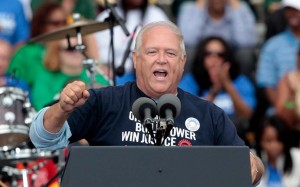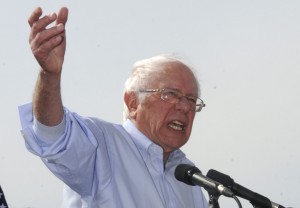
UAW President Dennis Williams is hoping a successful vote at Nissan's plant in Canton, Mississippi, will open more southern auto plants.
Workers at Nissan’s sprawling plant in Canton, Mississippi, are tentatively scheduled to vote early next month on whether the will be represented by the United Auto Workers.
The vote, which is scheduled for Aug. 3–4, will be a reprise of 2001 vote at Nissan’s assembly plant in Smyrna, Tennessee, which was easily won by the company.
The company and the union, however, have feuded for years about representation at the plant in Canton, which is located in a heavily African-American corner of Mississippi where Nissan maintains it has created new economic opportunities in one of the poorest regions of the country.
“The 6,400 Canton employees are a key part of the Nissan family, and they enjoy good, stable, safe jobs with some of the best wages and benefits in Mississippi. We do not believe that UAW representation is in the best interest of Nissan Canton and the people who work here. However, it is ultimately up to the employees to decide,” Nissan said in statement after agreeing to the vote.
(UAW pushes for organizing vote at Nissan’s Mississippi plant. Click Here to see the story.)
The UAW, however, has relied on decades old links to the Civil Rights movement, which led to sweeping changes to life in the Southern United States during the 1960s and 1970s.

Sen. Bernie Sanders spoke at a rally for UAW representation at Nissan's plant in Canton, Mississippi.
The pro-union Mississippi Alliance for Fairness at Nissan— a coalition of civil-rights leaders, ministers and worker advocates — have criticized Nissan for violating workers’ rights and unions representing Nissan workers in Europe and in Japan have also condemned the Nissan’s anti-union efforts in Canton, which included blocking a visit to the plant last year by a member of the France’s House of Deputies.
The UAW also noted that between November 2015 and May 2017, the NLRB, which has been dominated by appointees of President Barack Obama, issued a series of complaints against Nissan and the company’s temp-worker agency Kelly Services for violating workers’ rights by “interfering with, restraining and coercing employees in the exercise of their rights.”
The NLRB alleged that Nissan unlawfully threatened to close the Canton plant if workers unionized and also threatened employees with termination. Nissan used similar threats during the UAW’s 2001 campaign, which the union lost decisively.
The threat itself is rather dubious simply because the plant builds a half-dozen different products needed by Nissan dealers across the U.S.
In addition, the UAW said that the U.S. Occupational Safety and Health Administration also has issued multiple citations against Nissan for violations of federal safety and health laws in Canton. The most recent citations, in February 2017, found the company “did not furnish employment and a place of employment which was free from recognized hazards that were causing or likely to cause death or serious physical harm to employees.”
(Nissan says “No” to UAW. To see more about organizing efforts, Click Here.)
For the NLRB to supervise the election at least one third of employees eligible to vote in the election must sign petitions asking for a vote.
The UAW criticized Nissan for stepping up efforts to intimidate employees following an announcement earlier this month that an election petition had been filed. The union had wanted a quick vote on representation to slow down the momentum of Nissan’s anti-union effort.
The UAW said Nissan’s treatment of workers in Mississippi is contrary to statements made last year by Carlos Ghosn, chairman and CEO of the Renault-Nissan Alliance. In a February 2016 hearing before the French National Assembly, Ghosn denied allegations that Nissan opposes employee representation in Mississippi, claiming the company “has no tradition of not cooperating with unions.”
Gary Casteel, UAW Secretary-Treasurer and head of the union’s International Department, which has battled Nissan’s management over the working conditions in Canton, dismissed Ghosn’s claim.
“Over the past six days, Nissan has made it abundantly clear that it does not respect its Mississippi employees’ rights to vote in a free and fair election,” Casteel said in a statement. “In fact, the company is running one of the most aggressive anti-worker campaigns that we’ve seen in modern U.S. history.”
(Hoping to organize Southern car plans, UAW adopts pro-Trump stance. For the details, Click Here.)
The UAW has sought to organize workers at Southern Factories for nearly three decades. It narrowly lost a vote among employees at new Volkswagen plant in Chattanooga, Tennessee, in 2014 but won a separate vote among maintenance workers at the Chattanooga plant in 2015. But the union has yet to complete work on a contract for the maintenance employees.
